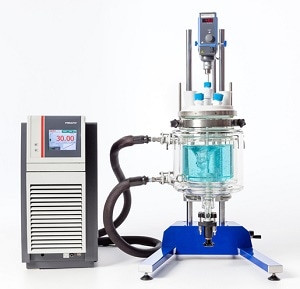Asynt has produced a new report that compares the thermal performance and advantages of vacuum jacketed versus non-vacuum jacketed reaction vessels.

Data is presented for vacuum jacketed and non-vacuum jacketed reaction vessels connected to a Julabo Presto A30 temperature control system. The report demonstrates that a vacuum jacketed vessel not only achieved faster rates of cooling but was also able to maintain a reaction at -20°C compared to just -15°C for the non-vacuum jacketed vessel.
Beneficially, also using a vacuum jacketed vessel was shown to eliminate ice formation on the outside of the reactor glass (a common problem with non-vacuum jacketed reaction vessels), allowing continuous viewing of the reactor contents.
By reducing heat loss / gain a glass vacuum jacket enables faster rates of heating and uses less energy to cool the system, thereby enabling lower temperatures to be achieved than reactor vessels without a vacuum jacket.
The report concludes that using a vacuum jacketed reaction vessel will allow you to optimise thermal performance thereby improving control of reactions.
In addition, the report proposes that the small additional cost of a vacuum jacketed vessel is easily justified not only by the additional performance but also by the cost saving of being able to use a lower powered temperature control system.
Vacuum jacketed reaction vessels are available as options for the Asynt ReactoMate Pilot (5-50 litres) and for the Asynt ReactoMate Datum (100ml - 5 litres) reactor systems.
For a copy of the report and further information on vacuum jacketed reactor systems please visit http://www.asynt.com/product/vacuum-jacketed-reaction-vessels/** or contact Asynt on +44-1638-781709 / [email protected].
About Asynt
Asynt is a leading supplier of affordable products, consumables and services for chemists in industry and academia. With staff of trained chemists - Asynt is able to draw upon this in-depth applications knowledge to provide a high level of customer support for its DrySyn Heating Blocks, Controlled Lab Reactors, Synthesis Tools, Evaporators, Circulators, Temperature Control Systems, Vacuum Pumps and Laboratory Safety Equipment.